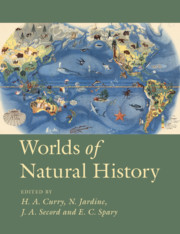19 results
Introduction
-
- Book:
- Worlds of Natural History
- Published online:
- 13 December 2018
- Print publication:
- 22 November 2018, pp 1-14
-
- Chapter
- Export citation
Plate Section (PDF Only)
-
- Book:
- Worlds of Natural History
- Published online:
- 13 December 2018
- Print publication:
- 22 November 2018, pp 635-656
-
- Chapter
- Export citation
Frontispiece
-
- Book:
- Worlds of Natural History
- Published online:
- 13 December 2018
- Print publication:
- 22 November 2018, pp iii-iii
-
- Chapter
- Export citation
Copyright page
-
- Book:
- Worlds of Natural History
- Published online:
- 13 December 2018
- Print publication:
- 22 November 2018, pp vi-vi
-
- Chapter
- Export citation
Contents
-
- Book:
- Worlds of Natural History
- Published online:
- 13 December 2018
- Print publication:
- 22 November 2018, pp vii-x
-
- Chapter
- Export citation
Plates
-
- Book:
- Worlds of Natural History
- Published online:
- 13 December 2018
- Print publication:
- 22 November 2018, pp xi-xii
-
- Chapter
- Export citation
IV - Connecting and conserving
-
- Book:
- Worlds of Natural History
- Published online:
- 13 December 2018
- Print publication:
- 22 November 2018, pp 399-532
-
- Chapter
- Export citation
Figures
-
- Book:
- Worlds of Natural History
- Published online:
- 13 December 2018
- Print publication:
- 22 November 2018, pp xiii-xvi
-
- Chapter
- Export citation
III - Publics and empires
-
- Book:
- Worlds of Natural History
- Published online:
- 13 December 2018
- Print publication:
- 22 November 2018, pp 287-398
-
- Chapter
- Export citation
I - Early modern ventures
-
- Book:
- Worlds of Natural History
- Published online:
- 13 December 2018
- Print publication:
- 22 November 2018, pp 15-148
-
- Chapter
- Export citation
Epilogue
-
- Book:
- Worlds of Natural History
- Published online:
- 13 December 2018
- Print publication:
- 22 November 2018, pp 533-544
-
- Chapter
- Export citation
Index
-
- Book:
- Worlds of Natural History
- Published online:
- 13 December 2018
- Print publication:
- 22 November 2018, pp 635-656
-
- Chapter
- Export citation
Acknowledgements
-
- Book:
- Worlds of Natural History
- Published online:
- 13 December 2018
- Print publication:
- 22 November 2018, pp xxv-xxvi
-
- Chapter
- Export citation
Advance praise for Worlds of Natural History
-
- Book:
- Worlds of Natural History
- Published online:
- 13 December 2018
- Print publication:
- 22 November 2018, pp ii-ii
-
- Chapter
- Export citation

Worlds of Natural History
-
- Published online:
- 13 December 2018
- Print publication:
- 22 November 2018
Notes
-
- Book:
- Worlds of Natural History
- Published online:
- 13 December 2018
- Print publication:
- 22 November 2018, pp 545-634
-
- Chapter
- Export citation
Notes on contributors
-
- Book:
- Worlds of Natural History
- Published online:
- 13 December 2018
- Print publication:
- 22 November 2018, pp xvii-xxiv
-
- Chapter
- Export citation
II - Enlightened orders
-
- Book:
- Worlds of Natural History
- Published online:
- 13 December 2018
- Print publication:
- 22 November 2018, pp 149-286
-
- Chapter
- Export citation
Arianne Baggerman and Rudolf Dekker, Child of the Enlightenment: Revolutionary Europe Reflected in a Boyhood Diary, Egodocuments and History Series (Leiden: Brill, 2009), pp. xii + 555, €99.00/$158.00, hardback, ISBN: 978-90-04-17269-2.
-
- Journal:
- Medical History / Volume 55 / Issue 1 / January 2011
- Published online by Cambridge University Press:
- 17 May 2012, pp. 126-127
-
- Article
-
- You have access
- Export citation



